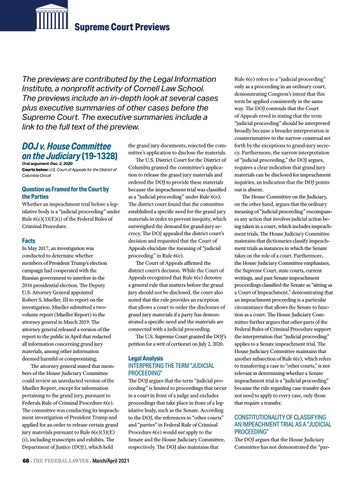Supreme Court Previews
The previews are contributed by the Legal Information Institute, a nonprofit activity of Cornell Law School. The previews include an in-depth look at several cases plus executive summaries of other cases before the Supreme Court. The executive summaries include a link to the full text of the preview.
DOJ v. House Committee on the Judiciary (19-1328) Oral argument: Dec. 2, 2020 Courts below: U.S. Court of Appeals for the District of Columbia Circuit
Question as Framed for the Court by the Parties Whether an impeachment trial before a legislative body is a “judicial proceeding” under Rule 6(e)(3)(E)(i) of the Federal Rules of Criminal Procedure.
Facts In May 2017, an investigation was conducted to determine whether members of President Trump’s election campaign had cooperated with the Russian government to interfere in the 2016 presidential election. The Deputy U.S. Attorney General appointed Robert S. Mueller, III to report on the investigation. Mueller submitted a twovolume report (Mueller Report) to the attorney general in March 2019. The attorney general released a version of the report to the public in April that redacted all information concerning grand jury materials, among other information deemed harmful or compromising. The attorney general stated that members of the House Judiciary Committee could review an unredacted version of the Mueller Report, except for information pertaining to the grand jury, pursuant to Federals Rule of Criminal Procedure 6(e). The committee was conducting its impeachment investigation of President Trump and applied for an order to release certain grand jury materials pursuant to Rule 6(e)(3)(E) (i), including transcripts and exhibits. The Department of Justice (DOJ), which held
the grand jury documents, rejected the committee’s application to disclose the materials. The U.S. District Court for the District of Columbia granted the committee’s application to release the grand jury materials and ordered the DOJ to provide these materials because the impeachment trial was classified as a “judicial proceeding” under Rule 6(e). The district court found that the committee established a specific need for the grand jury materials in order to prevent inequity, which outweighed the demand for grand-jury secrecy. The DOJ appealed the district court’s decision and requested that the Court of Appeals elucidate the meaning of “judicial proceeding” in Rule 6(e). The Court of Appeals affirmed the district court’s decision. While the Court of Appeals recognized that Rule 6(e) denotes a general rule that matters before the grand jury should not be disclosed, the court also noted that the rule provides an exception that allows a court to order the disclosure of grand jury materials if a party has demonstrated a specific need and the materials are connected with a judicial proceeding. The U.S. Supreme Court granted the DOJ’s petition for a writ of certiorari on July 2, 2020.
Legal Analysis INTERPRETING THE TERM “JUDICIAL PROCEEDING” The DOJ argues that the term “judicial proceeding” is limited to proceedings that occur in a court in front of a judge and excludes proceedings that take place in front of a legislative body, such as the Senate. According to the DOJ, the references to “other courts” and “parties” in Federal Rule of Criminal Procedure 6(e) would not apply to the Senate and the House Judiciary Committee, respectively. The DOJ also maintains that
68 • THE FEDERAL LAWYER • March/April 2021
Rule 6(e) refers to a “judicial proceeding” only as a proceeding in an ordinary court, demonstrating Congress’s intent that this term be applied consistently in the same way. The DOJ contends that the Court of Appeals erred in stating that the term “judicial proceeding” should be interpreted broadly because a broader interpretation is counterintuitive to the narrow construal set forth by the exceptions to grand-jury secrecy. Furthermore, the narrow interpretation of “judicial proceeding,” the DOJ argues, requires a clear indication that grand jury materials can be disclosed for impeachment inquiries, an indication that the DOJ points out is absent. The House Committee on the Judiciary, on the other hand, argues that the ordinary meaning of “judicial proceeding” encompasses any action that involves judicial action being taken in a court, which includes impeachment trials. The House Judiciary Committee maintains that dictionaries classify impeachment trials as instances in which the Senate takes on the role of a court. Furthermore, the House Judiciary Committee emphasizes, the Supreme Court, state courts, current writings, and past Senate impeachment proceedings classified the Senate as “sitting as a Court of Impeachment,” demonstrating that an impeachment proceeding is a particular circumstance that allows the Senate to function as a court. The House Judiciary Committee further argues that other parts of the Federal Rules of Criminal Procedure support the interpretation that “judicial proceeding” applies to a Senate impeachment trial. The House Judiciary Committee maintains that another subsection of Rule 6(e), which refers to transferring a case to “other courts,” is not relevant in determining whether a Senate impeachment trial is a “judicial proceeding” because the rule regarding case transfer does not need to apply to every case, only those that require a transfer.
CONSTITUTIONALITY OF CLASSIFYING AN IMPEACHMENT TRIAL AS A “JUDICIAL PROCEEDING” The DOJ argues that the House Judiciary Committee has not demonstrated the “par-




